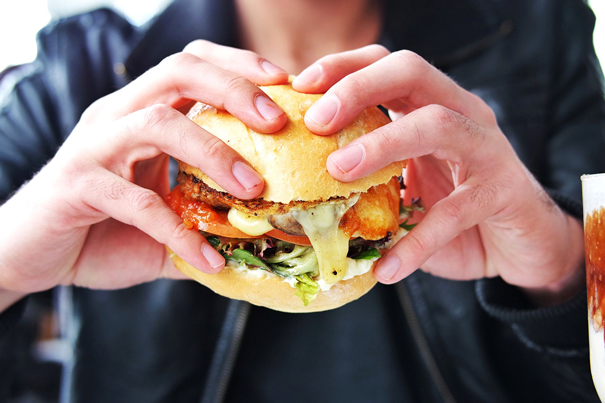
There are two types of people who posts pictures of food online. The #eatclean brigade – usually intricately prepared salads and middle-class people in Breton tops mashing avocado onto a wholemeal crumpet – and their saucier, bawdier rivals the, #foodporn squad.
#foodporn dismisses fretting over calorie counts and complex carbs and eschews cutlery in favour of cholesterol-charging and increasingly bizarre combinations of foods your local school's kitchen would be shut down for offering it hadn’t been closed down already. Huge juicy burgers, fat dribbling off them like their fans’ life expectancy, jammed between two slabs of – no, not bread, too easy, too basic – more meat.
Something even richer, like ostrich perhaps. Piled next to it are fries, immolated in hot butter in a deep fat fryer at least five times, topped by relish, melted Monterey Jack and slivers of charred streaky bacon. Chicken burgers also make a guest appearance, usually jammed between something even more ridiculous, like halves of avocado for the health conscious or, in a re-enactment of a popular American breakfast, between two waffles. Never mind that it looks like a car accident and just looking at it made your left ventricle snap shut, it’s #foodporn.
The bun's an avocado! Hands up, who's tried the new avo burger @FriedChickenLDN Covent Gdn? You SO should! #skint pic.twitter.com/k0BsRy3LEK
— Skint London (@SkintLondon) September 9, 2016
We've tried the waffle burger – a perfect equation between sweet and savoury flavours. #foodie #foodporn pic.twitter.com/9VzeVkVcZU
— Culture Trip (@CultureTrip) September 9, 2016
Food like burgers, chips, breaded chicken and fish fingers have long been part of the staple diet of growing up in working class families. How strange it is to see the food of my childhood – which was interspersed with plenty of vegetables, by the way; we know how to cook those too – appropriated and fetishised in this way.
The ironic enjoyment, or “om-nom-nom-ification”, of the kind of food you’d find people buying in frozen food stores like Iceland seems to be at odds with the messaging the government likes to throw out at families on benefits and low incomes. These people need educating about how to eat healthily, we’re told, because government figures show nearly a third of children between the ages of 2 and 15 are obese. While it’s true eating habits must become at least more balanced, as long as you’ve got the money to pay £15 for your 1,000-calorie man-versus-food triple quarter pounder, and it comes served on an enamel dish in a repurposed jam factory with a ceiling full of filament bulbs, you can gorge as much as you want. Head to your local takeaway and sit eating a burger out of an orange polystyrene box, however, and all of a sudden you’re everything that’s wrong with this country.
Money tends to be the driving factor of gaping double standards when it comes to food, diet and body image. Nigella Lawson whips up a belt-busting double chocolate cake on TV and her adoring fans go into paroxysms of ecstasy on social media, contestants in the Great British Bake Off spend a whole series fawning over sugary treats your grandma could’ve knocked out in one afternoon, yet the yum-yums and iced cupcakes in the window of your local Greggs, adored by millions, get very little appreciation. Junk food, or stuff that’s really bad for you, is only acceptable when it costs, is labelled as artisan, or is a hangover cure. Frozen pizza and a sausage roll for dinner if you’re a family on a low budget? Burn the witches!
The same menu if you’re living in a flat that comes with a dishwasher as standard and are feeling a bit rough after too many martinis the night before? Om nom nom. Comfort food is fine if you don't need to eat it forever. With around one in eight households in the UK living in “problem debt”, it’s easy to see why quick, inexpensive solutions like frozen burgers are popular at teatime. And while altruistic TV chefs are queuing up to tell you there are equally cheap nutritious alternatives, they don’t necessarily take into account that such families are usually working long hours in menial jobs and are time-poor – shopping for and preparing a bunch of ingredients isn’t always an easy option, and after a hard day at work they may be less inclined to argue with their children about the nutritional virtues of broccoli florets when all they want is pizza.
Selling a healthy lifestyle to people on lower incomes isn’t impossible, but when you make gorging on towering burgers and artisan chicken-shop wings seem so aspirational, so desirable, you can’t blame them for wondering why it’s OK to stuff yourself with cake if you’re rich. Food banks, generally, don’t have any ingredients for a superfood salad to go with your burger, I’m afraid. Calories, fat and blocked arteries, however, have no class system – sugar is sugar, carbs are carbs. You can fool yourself into thinking your “dirty burger” is an exception, but your body knows different.